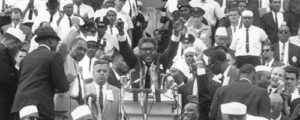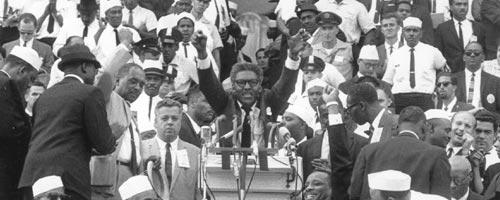Movie Info
Movie Info
- Director
- Nancy D. Kates and Bennett Singer
- Run Time
- 1 hour and 23 minutes
- Rating
- Not Rated
VP Content Ratings
- Violence
- 2/10
- Language
- 2/10
- Sex & Nudity
- 2/10
- Star Rating
Relevant Quotes
I have seen the wicked oppressing and towering like a cedar of Lebanon.
Be gracious to me, O God, for people trample on me; all day long foes oppress me…
“We need in every community a group of angelic troublemakers.”

Co-directors Nancy D. Kates and Bennett Singer offer us a great opportunity to learn the biographical details of the man sometimes called “The forgotten Civil Rights leader”—right before the dramatic biopic Rustin hits the theaters November 3 and is streamed on Netflix the 17th. Through interviews with those who knew him, including a nephew, and archival footage, we gain a good picture of this organizing genius. Indeed, there is so much archival footage of him debating and speaking at major events that it is a wonder that he has been so forgotten!
Born in Pennsylvania in 1912, Rustin was raised by his maternal grandparents. Grandmother Julia Rustin especially influenced him, he accepting her Quaker pacifism. And when he mentioned that he preferred the company of men to that of women, she did not condemn him, but said, “I suppose that’s what you need to do.” She was an active member of the NAACP, often hosting its leaders W. E. B. Du Bois and James Weldon Johnson in her home. Thus, it was natural that as a young man he fought against Jim Crow laws.
For a while he was a member of the Young Communist League because they were one of the few agencies championing Negro rights before World War 2, but when they followed Moscow’s lead and dropped his cause, he left it. In 1942 he was part of the first of what later would be called “Freedom Ride,” during which he was arrested, beaten, and jailed briefly. World War 2 was raging, but his pacifist views led to his refusal to be drafted into the armed forces, so he spent several years in federal two prisons—at both he organized protests against racial discrimination.
Considerable time is given to his joining the staff of the Fellowship of Reconciliation, headed by the noted pacifist A. J. Muste. Such F.O.R. members as Bill Sutherland speak warmly of him, and there is archival footage of A.J. Muste as well. The latter shared the pervasive negative view of homosexuality, so it is understandable that he eventually left the F.O.R.
Rustin’s Quaker pacifism naturally led him to become interested in Mahatma Gandhi, and though the Indian leader was murdered in 1948, later that year Rustin traveled to India to meet with followers of Gandhi and learn more about his nonviolent tactics. This section of the film is narrated by Devi Prasad, a lifelong pacifist and promoter of the teachings of Gandhi. Rustin would in turn pass on Gandhi’s nonviolence to Martin Luther King when he traveled to Montgomery to advise him during the Bus Boycott. I was pleased to see that footage from the movie Boycott depicting his arrival at the King home where armed guards stood outside is used in this documentary.
There is much more, including comments from the Rustin’s early lover Davis Platt and then the one from his later years (who persuaded him to advocate for gay rights), Walter Naegle. Platt points out that, unlike most gays of the time, Rustin showed no shame over his sexuality. Perhaps this was due to the quiet support of his grandmother? There are also clips of his debates with Malcolm X and Stokely Carmichael over nonviolence and Black Power. Late in the film we see his split from other C-R leaders when he refused to condemn the Vietnam War.
Of great interest, earlier in the film, is the news (to me) that Rustin had such a gifted voice that while a young man he sang professionally. For a brief time, he was part of the quartet formed by the great Black guitarist/singer Josh White . (about whom there ought to be a movie, he being one of the first Black singers to achieve nation-wide success in recordings and movies)
Rustin always seemed to be ahead of his time. Before John Lewis urged us to get into “good trouble,” Bayard Rustin declared, “We need in every community a group of angelic troublemakers.” Like the author of the first Psalms quotation, he was a tireless champion of the oppressed, and like the second, he was himself a member of still another oppressed group.
Maybe, at last, with the majority of Americans rejecting the literalist interpretation of the Bible and thus accepting gays into the mainstream of social life, he will receive his due. Without him, Martin Luther King, Jr. would not have adopted nonviolence as a lifestyle, nor would there have been a March on Washington. Can you imagine never thrilling to the sound of “I have a dream…”?
This review will be in the Nov. issue of VP along with a set of questions for reflection and/or discussion. If you have found reviews on this site helpful, please consider purchasing a subscription or individual issue in The Store.

